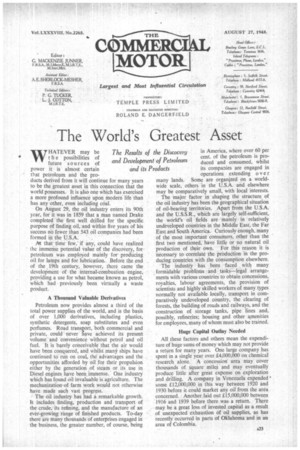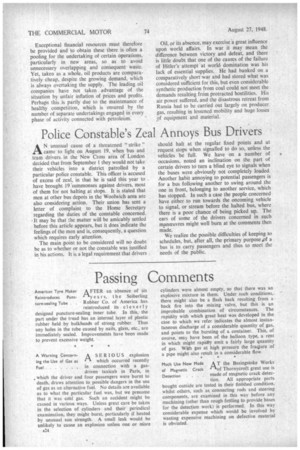The World's Greatest Asset
Page 25

Page 26

If you've noticed an error in this article please click here to report it so we can fix it.
The Results of the Discovery and Development of Petroleum and its Products
TI THATEVER may be t h e possibilities of future sources of power it is almost certain petroleom and the pro ducts derived from it will continue for many years to be the greatest asset in this connection that the world possesses. It is also one which has exercised a more profound influence upon modern life than has any other, even including coal.
On August 29, the oil industry enters its 90th year, for it was in 1859 that a man named Drake completed the first well drilled for the specific purpose of finding oil, and within five years of his success no fewer than 543 oil companies had been formed in the U.S.A. .
At that time few,' if any, could have realized the immense potential value of the discovery, for petroleum was employed mainly for producing oil for lamps and for lubrication. Before the end of the ..19th century, however, there came the development of the internal-combustion engine, providing a use for what became known as petrol, which had previously been virtually a waste product.
A Thousand Valuable Derivatives Petroleum now provides almost a third of the total power supplies of the world, and is the basis of over 1,000 derivatives, including plastics, synthetic detergents, soap substitutes and even perfumes. Road transport, both commercial and private, could never have achieved its present volume and convenience without petrol and oil fuel. It is barely conceivable that the air would have been conquered, and whilst motif ships have continued to run on coal, the advantages and the opportunities afforded by oil for their propulsion either by the generation of steam or its use in Diesel engines have been. immense. One industry which has found oil invaluable is agriculture. The mechanization-of farm work would not otherwise have made such vast progress.
The oil industry has had a remarkable growth. It inclodes finding, production and transport of the crude, its refining, and the manufacture of an ever-growing range of finished products. To-day there are many thousands of enterprises engaged in the business, the greater number, of course, being in America, where over 60 per cent. of the petroleum is produced and consumed, whilst its companies are engaged in operations extending over many lands. Some are organized on a worldwide scale, others in the U.S.A. and elsewhere may be comparatively small, with local interests. The major factor in shaping the structure, of the oil industry has been the geographical situation of oil-bearing territories. Apart from the U.S.A. and the U.S.S.R., which are largely self-sufficient, the world's oil fields are mainly in relatively undeveloped countries in the Middle East, the Far East and South America. Curiously enough, many of the most important consumers, other than the first two mentioned, have little or no natural oil production of their own. For this reason it is necessary to correlate the production in the producing countries with the consumption elsewhere. The industry has been faced with many formidable problems and _tasks—legal arrangements with various countries to obtain concessions, royalties, labour agreements, the provision of scientists and highly skilled workers of many types normally not available locally, transport in comparatively undeveloped country, the clearing of forests, the building of roads and railways, and the construction of storage tanks, pipe lines and, possibly, refineries; housing and other amenities for employees, many of whom must also be trained.
Huge Capital Outlay Needed All these factors and others mean the expenditure of huge sums of money which may not provide a return for many years. One large company has spent in a single year over £4,000,000 on chemical research alone. A concession area may cover thousands of Square miles and may eventually producelittle after great expense on exploration and drilling. A company in Venezuela expended • some £12,000,000 in this way between 1920 and 1930 before it could market any oil from the area concerned. Another laid out £15,000,000 between 1916 and 1939 before there was a return. There may be a great loss of invested capital as a result of unexpected exhaustion of oil supplies, as has recently occurred in parts of Oklahoma and in an area of Colombia. Exceptional financial resources must therefore be provided and to obtain these there is often a pooling for the undertaking of certain operations. particularly in new areas, so as to avoid unnecessary overlapping and conSequent waste. Yet, taken as a whole, oil products are comparatively cheap, despite the growing demand, which is always overtaking the supply. The leading oil companies have not taken advantage of the situation by unfair inflation of prices and profits. Perhaps this is partly due to the maintenance of healthy competition, which is ensured by the number of separate undertakings engaged in every phase of activity connected with petroleum. Oil, or its absence, may exercise 'a great influence upon world affairs. In war it may mean the difference between victory and defeat, and there is little doubt that one of the causes of the failure of Hitler's attempt at world domination was his lack of essential supplies. He had banked on a comparatively short war and had stored what was considered sufficient for this, but even considerable synthetic production from coal could not meet the demands resulting from protracted hostilities. His air power suffered, and the disastrous retreat from Russia had to be carried out largely on producer gas, resulting in lessened mobility and huge losses of equipment and material.




















































































